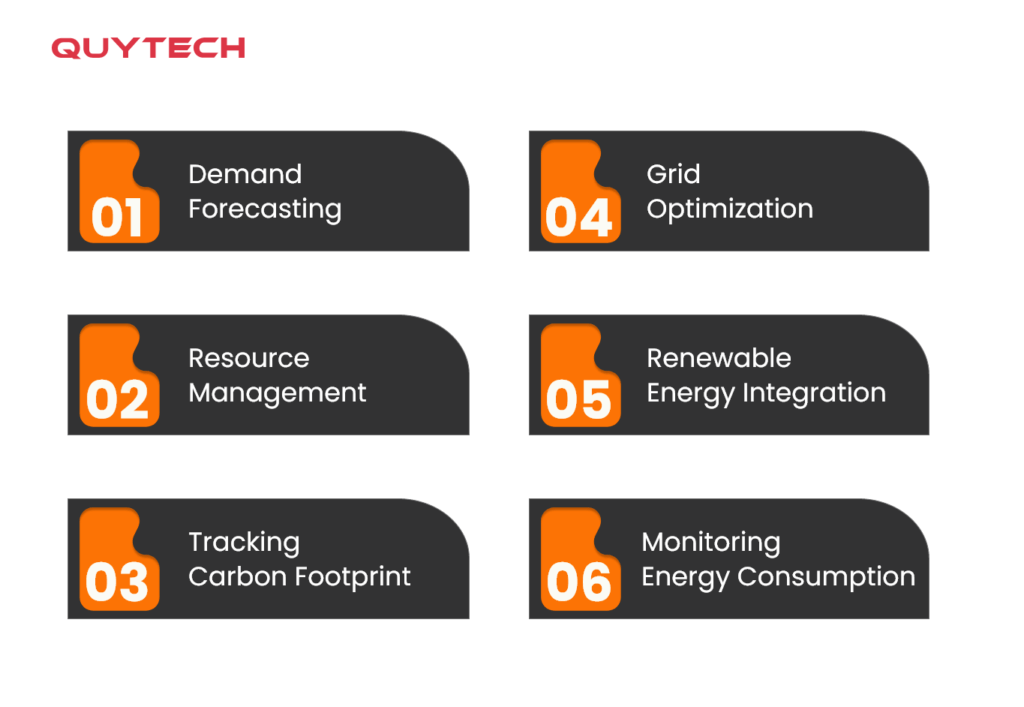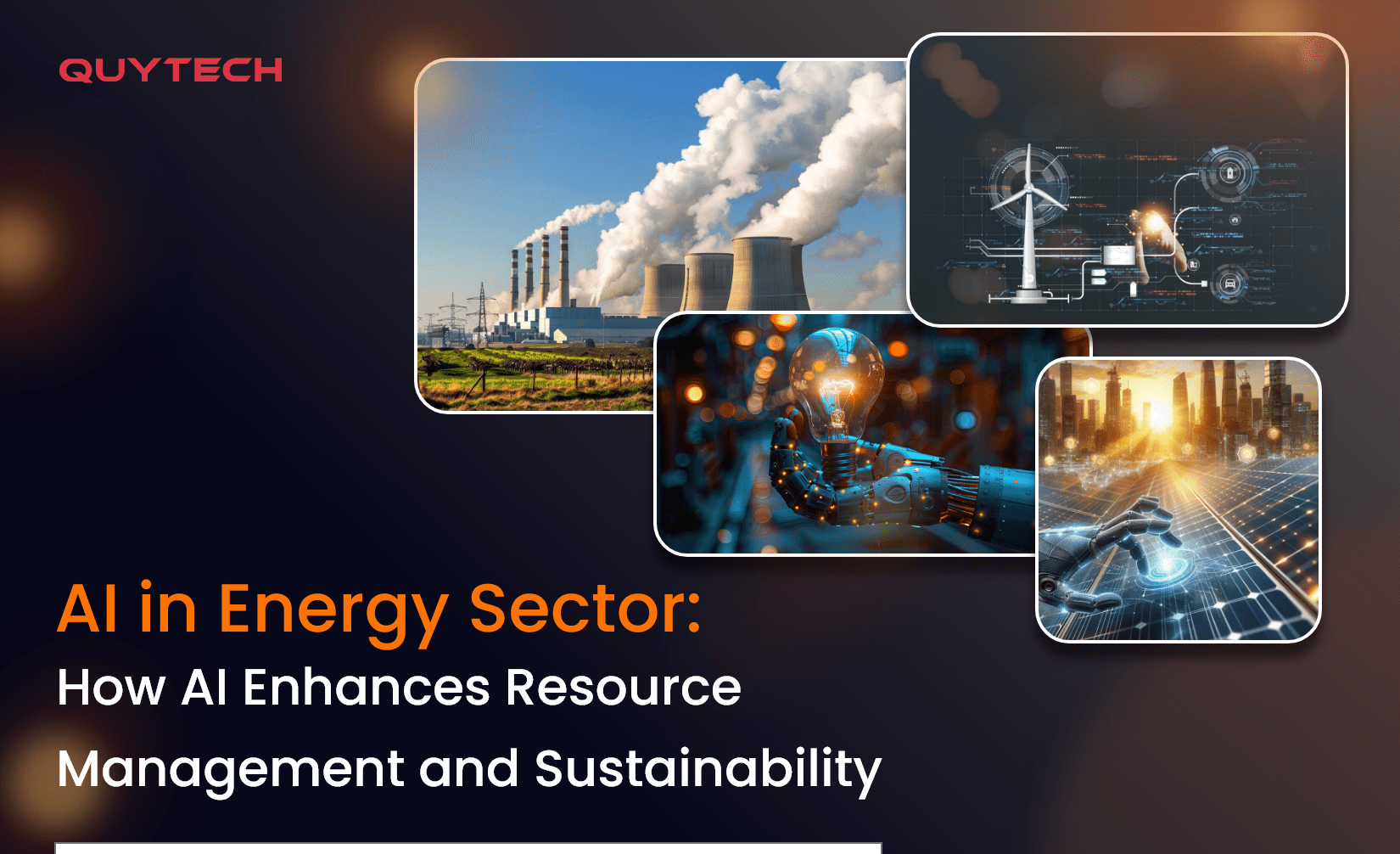AI in the energy sector for optimizing resource management and ensuring sustainability is no longer a dream! Yes, you read that correctly. Along with transforming other critical areas of the energy industry, artificial intelligence revolutionizes how energy resources are managed to maximize efficiency and minimize environmental impact.
The technology processes historical data and other patterns to forecast energy consumption, monitor grids in real-time to identify potential problems, suggest energy-saving techniques, and help reduce energy waste to eliminate greenhouse gas emissions.
Wondering how? Let’s dig deeper into this blog that focuses on how AI is used in the energy sector for these two specific use cases.
AI in Energy: Market Statistics
By using AI in the energy sector, we mean reshaping the industry that involves the production, distribution, and consumption of energy. Here are some interesting market statistics that highlight the impact and growing adoption of this technology:
- The size of AI in the renewable energy market is projected to reach $4.6 billion by 2032, with a CAGR of a whopping 23.2%. These numbers are for the period of 2023 to 2032.
- General Electric, Enel Green Power, Hazama Ando Corporation, and Siemens AG are some key players utilizing the potential of artificial intelligence for optimizing resources and cutting carbon emissions.
- North America captured the biggest share of AI in the energy domain in 2023.
How AI in the Energy Sector Revolutionizes Optimizing Resource Management and Sustainability?
Here is how AI brings transformation by optimizing resource management and sustainability:

Demand Forecasting
AI-powered systems can efficiently handle vast amounts of data and weather patterns and analyze other crucial parameters to predict energy demand. This enables businesses to build strategies for required power generation to meet demand and supply while minimizing waste and enhancing efficiency.
Grid Optimization
Artificial intelligence and the Internet of Things technology can together conduct efficient real-time monitoring of electric grids to identify issues and optimize operations that directly impact energy production. It also helps businesses to take a proactive approach to minimize the risk of outage and enhance the overall grid stability.
Resource Management
By analyzing sensor data collected from energy infrastructure, AI-enabled solutions can even contribute to allocating resources optimally. It also ensures that no resource or asset is being used beyond its potential or capacity by suggesting scheduled maintenance and predicting the chances of an equipment failure.
Renewable Energy Integration
With AI’s predictive analytics capabilities, businesses can get an idea of the output generated by each energy source of an organization. They can build strategies for a stable and reliable energy supply.
Tracking Carbon Footprint
Implementing artificial intelligence-powered systems empowers organizations to identify and address energy waste and get recommendations on how to reduce carbon emissions by optimizing processes and making the best use of resources.
Monitoring Energy Consumption
Artificial intelligence can help businesses with real-time monitoring of energy consumption to make informed or data-backed decisions on how much energy is required to be generated as per the demand.
Benefits of Using AI in the Energy Industry for Resource Optimization and Management and Achieving Sustainability
Integrating artificial intelligence in the energy section enables companies to make the best of resources and manage them efficiently to eliminate unnecessary waste and pave the way for a greener future. Here are other amazing benefits of the technology renders:
Improved Resource Allocation
AI can process enormous amounts of data within minutes and without manual intervention to help with the efficient distribution of energy. Using the data, it can predict demand and identify potential issues that can lead to energy shortage or surplus.
Enhanced Energy Efficiency
Another major advantage of AI in energy is enhancing efficiency. By implementing AI-powered systems, companies can get timely suggestions or recommendations for saving energy. The technology does this by analyzing consumption patterns and pinpointing inefficiencies. With this, AI contributes to reducing consumption, lowering operating costs, and minimizing CO2 emissions.
Expedited Renewal Energy Integration
AI plays a significant role in integrating renewable energy sources like solar and wind power into the grid. The technology can predict energy outputs and manage fluctuations for better grid stability and resilience.
Decreased Waste and Greenhouse Gas Emissions
AI efficiently optimizes operations associated with resource management by identifying the sources that lead to carbon emissions. It helps promote a more sustainable future and a cleaner and healthier planet.
Prevention of Potential Energy-Related Problems
Power outages and surpluses are among the biggest issues the energy sector faces when it comes to managing and optimizing resources and ensuring sustainability. AI can detect and address potential problems even before they occur. It can minimize the frequency and severity of both these problems.
Advanced Predictive Maintenance
AI along with IoT (Internet of Things) can analyze data collected from sensors to predict equipment failures and maintenance scheduling. It can keep problems like unplanned outages and increased downtime at bay while extending the lifespan of equipment.
Informed Decision Making
AI can help energy companies with critical data-based insights to help them make informed decisions and optimize resource management. The technology can identify upcoming trends to allow businesses to grab market opportunities for growth, cost saving, and environmental preservation.
Improved CyberSecurity
Integrating AI-powered solutions and apps in the energy industry can empower companies to eliminate cybersecurity risks. The technology continuously assesses network traffic to find anomalies or patterns that show the chances of cyberattacks.
AI in Energy Sector: Real-World Examples
Below are the top organizations using artificial intelligence to optimize energy consumption, increase energy efficiency, and optimize resource optimization to contribute to a greener tomorrow:
Chevron
This worldwide recognized energy corporation is using artificial intelligence to optimize the maintenance and operations of its oil and gas facilities. AI contributes to reducing the energy cost and enhancing efficiency.
National Grid
This leading electricity transmission and distribution company in the United Kindom uses artificial intelligence to forecast electricity demand and optimize grid operations.
Schneider Electric
This popular company uses an AI-powered platform to optimize energy management in its infrastructure and industrial facilities to track and reduce CO2 emissions.
Tesla
Tesla relies on two of its products, Powerwall and Powerpack to optimize energy consumption and integrate renewable energy sources to contribute to environmental preservation and achieve sustainability
How to Implement AI in the Energy Industry for Optimizing Resource Management and Reducing Carbon Effect?
Utilizing the full potential of artificial intelligence in the energy sector is possible by creating a customized and powerful AI-powered solution that focuses on improving these two key areas. For this, partner with a reliable AI development company with a proven background of catering to the needs of the energy sector. Here are some steps you need to take to use AI to optimize resource management and ensure sustainability.
- List your requirements to define the goals you want to achieve with an AI-enabled solution.
- Connect with a reliable AI development services provider from the top AI companies.
- Make sure the company you choose has deep domain expertise and experience creating apps and solutions for the energy sector. Check their portfolio for this.
- Select a partner that prioritizes customization and has a flexible pricing structure.
- Ensure the company adheres to the required security standards and compliance.
- Ask the company about a non-disclosure agreement to ensure the confidentiality and privacy of your information.
- Last but not least, don’t prioritize cost over quality; rather, find a technology partner that offers the best combination of both.
Apart from connecting with a company, you can hire AI developers on a full-time, part-time, or contract basis based on your project requirements. In that case, choose a reliable source to hire developers and follow the same steps to ensure their AI expertise and the success of your project.
The Future of AI in the Energy Sector
In the future, we can witness the growing adoption of artificial intelligence not just for optimizing resources and enabling a greener future, but also for other use cases like nuclear power plant monitoring, oil and gas exploration, smart homes and buildings, and energy trading. Besides, smart grids and demand response management systems will become a crucial part of organizations seeking to make the most of artificial intelligence technology.
Conclusion
The increasing adoption of AI in the energy industry to optimize resource management and attain sustainability proves the transformative potential of this technology. From predicting energy demands to optimal resource allocation and utilization, AI has immense potential that businesses can leverage for a better future and reduce environmental footprint.
Read this blog to learn how this technology transforms various processes to achieve the above-stated goals. In case, you are a business that wants to explore the full power of AI for these two specific use cases, partner with a reliable AI development company.



